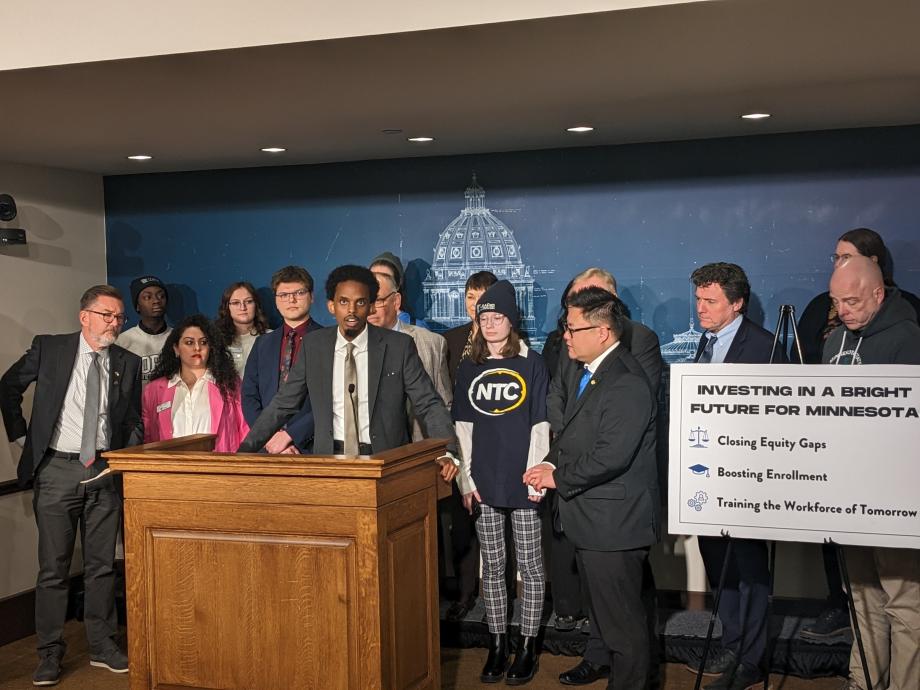The Minnesota House and Senate has taken bold action to make college affordable and address student basic needs. The legislation now awaits the Governor's signature, which is expected in the next week. The legislation includes new funding for Minnesota State of $292.9 million in the FY2024-2025 biennium and $168.3 million in the FY2025-2026.
The legislature grounded their decision making on the needs of students and made college affordability their top priority. Minnesota high school graduates now know that college is not just for wealthy families, but is an option for all young people who are willing to put in the work to go to college. This comes at a critical time when Minnesota needs more nurses, welders and teachers but students struggle to afford the education that they need to enter the workforce. The North Star Promise program will help more young people get the education they need without having to drown in debt.
Some of the key victories for students include:
- North Star Promise: The bill creates a scholarship program beginning in the fall of 2024 that covers all their tuition if they have a family income below $80,000. Students will need to complete a FAFSA and have not earned a bacholers degree, take at least one credit a semester and maintain satisfactory academic progress. There will be an additional grant for some students to match 50% of their Pell grant to pay for living expenses. The legislature allocated $117.226 million in FY2025 is appropriated for this program, with $49,500 ongoing money.
- Tuition Freeze: Students attending a Minnesota State college or university will have their tuition frozen over the next two years. The bill appropriates $75 million for a tuition freeze, which is $25 million in FY2024 and $50 million in FY2025, with $37.5 million in the tails to freeze tuition rates where they currently are.
In additional to making college affordable, the legislation also makes investments in key support programs to help students through their college experience. Those include:
- Hunger-Free Campus Grants: The bill $2.3 million to campus food panties that are designated as LeadMN Hunger-Free Campuses. The base amount for this program is $1 million. The initial institution designation award is increased from $8,000 to $25,000 and the sustaining award is increased from $5,000 to $15,000.
- Student Basic Needs Support: The bill includes $6.3 million to help campuses address basic needs insecurity, mental health and other high-need student support services by increasing the amount of available resources to students.
- Postsecondary Student Basic Needs Working Group: Included in the bill is $44,000 in one-time funding in FY2024 to administer a postsecondary student basic needs working group to review, assess, and make specific recommendations on strategies to meet the basic needs of higher education students.
- Z-Degree Textbook Program/Open Educational Resources: The bill appropriates $1 million in one-time additional funds each year of the biennium for a total of $2 million to reduce students’ textbook and course material costs by expanding free open educational resources, open textbooks, and implementation of Z-Degrees materials for students.
- Increasing State Grant Amounts: The bill increases the living and miscellaneous expense allowance (LME) in the State Grant program, which will increase the grant amount for low income students. The total amount allocated is $12 million in FY2024 and $9.1 million in FY2025.
- State Grant Simplification and Federal Conformity: The bill includes $17 million to help the State Grant program conform with changes to the federal needs analysis and Pell Grant calculation that go into effect this December.
- Student Parent Support Initiative: The bill includes $6 million for grants and services to support student parents and.
- Emergency Assistance for Students: The bill includes an additional $7 million for emergency assistance grants to meet the emergency needs of students. Of that funding, $2.25 million each year of the biennium is for direct emergency grants to students attending a Minnesota State college or university.
- Menstrual Products: The bill appropriates $750,000 to provide menstrual products in campus restrooms free of charge.
In addition to supporting basic needs, the legislation also funds some other key priorities that will help students:
- Minnesota State Stabilization: The bill appropriates $183 million for Minnesota State Stabilization, which will help address college and university inflationary needs.
- NextGen/ISRS: The bill appropriates $4.5 million for enterprise-wide technology system for students
- Workforce Development Scholarships: Maintains the $9 million for scholarship for students going into high demand fields and adds construction, education and public safety to the list of eligible programs for the workforce development scholarship program.
- Supplemental Aid to Non-Metro Colleges: Maintains $11 million to provide supplemental aid for operations and maintenance to the president of each two-year institution in the system with at least one campus that is not located in a metropolitan county.
- Sexual Assault Reporting: Maintains $80,000 in funding for sexual assault reporting.
Thank you to the Minn State government relations team for assembling these numbers and descriptions.
